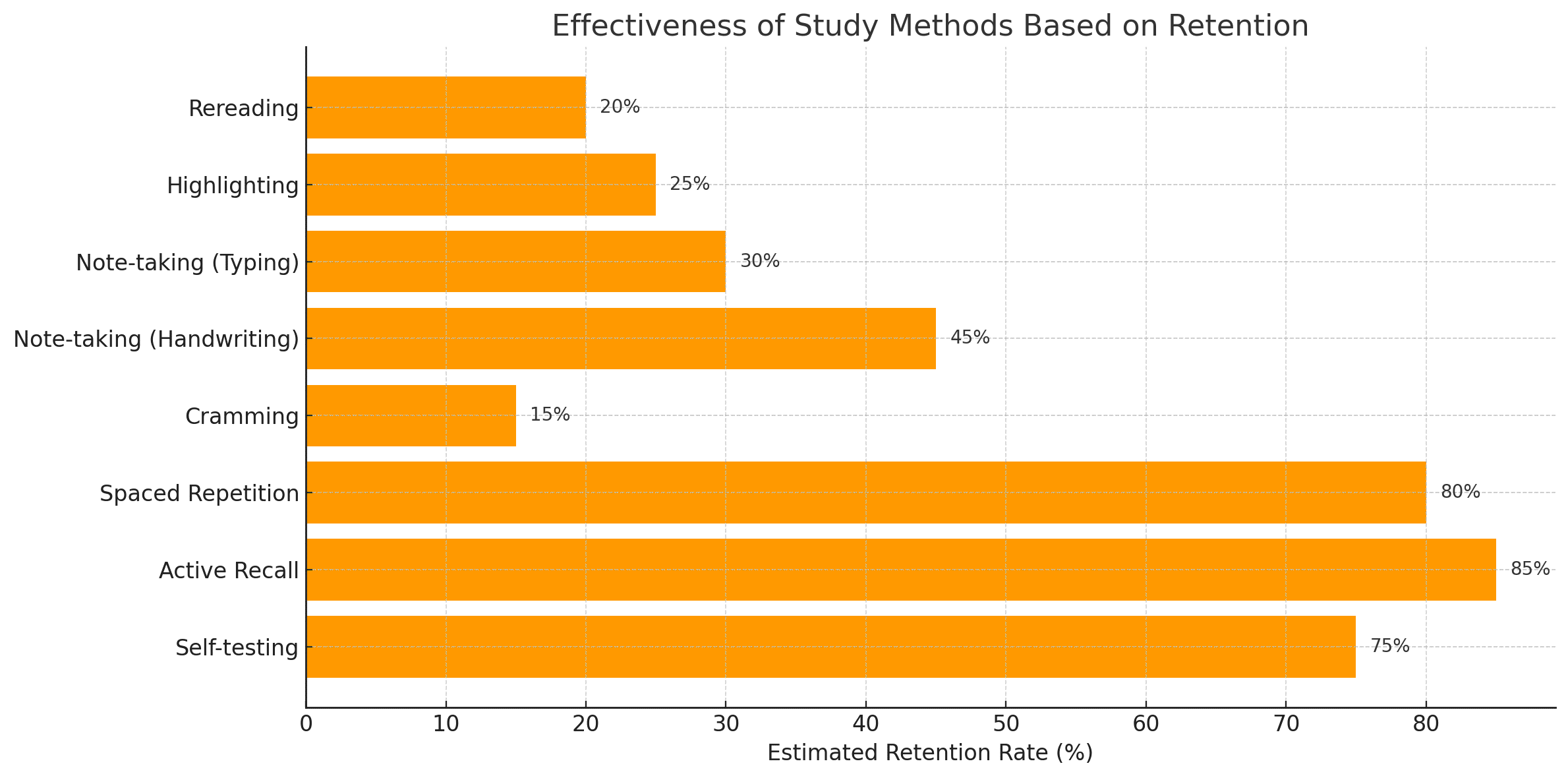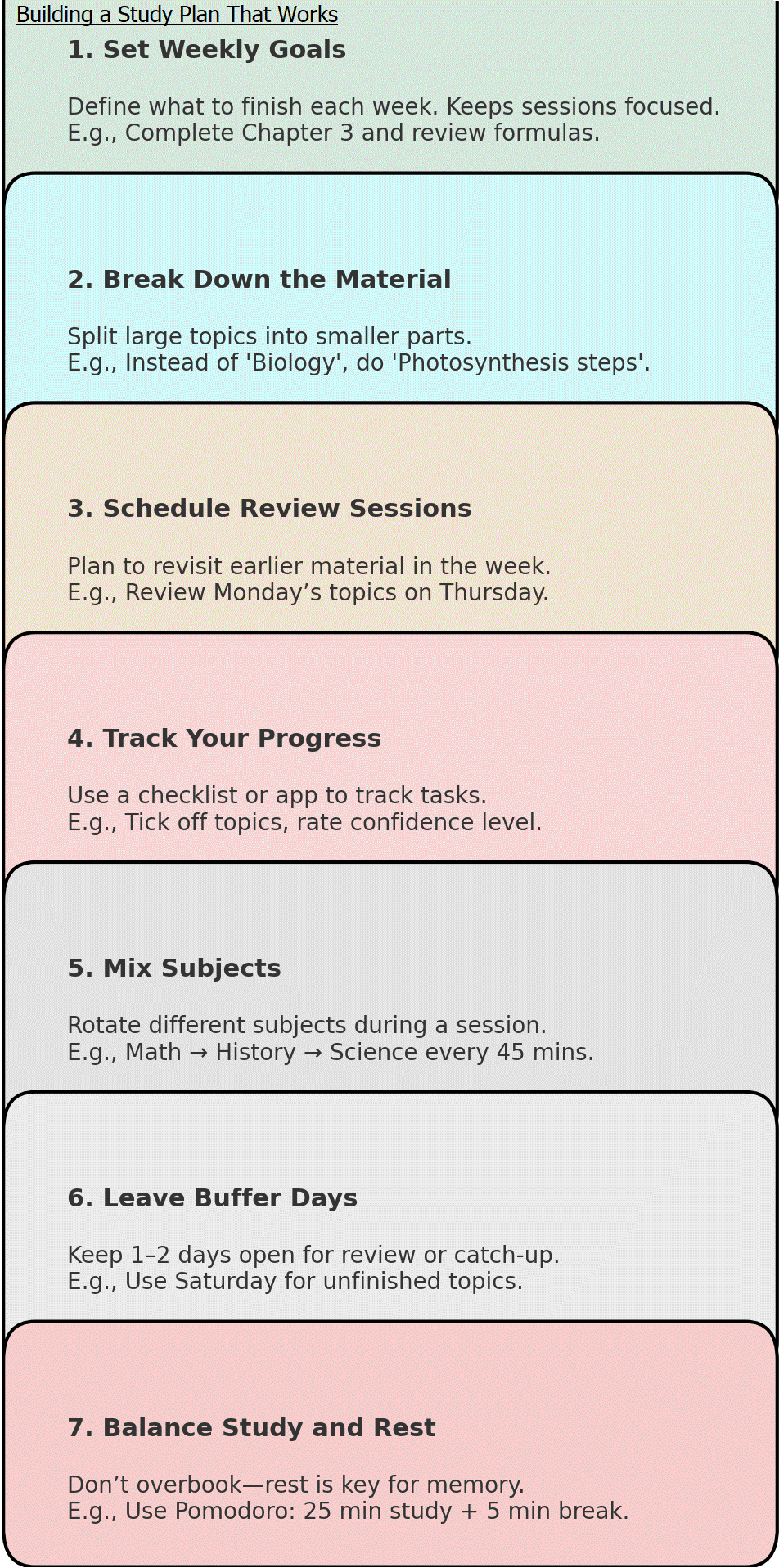
The Real Reason You're Not Seeing Results
Have you ever finished a long study session and felt unsure about the material? It’s frustrating to put in time and effort and not get your expected grades. The truth is, many students are using study methods that feel productive, but don’t help. You're not lazy. You're likely just using the wrong tools.
A 2013 report by Dunlosky and colleagues found that over 80% of students rely on low-efficiency strategies like rereading and highlighting. These methods give the illusion of learning, but your brain needs more than repetition to remember information when it counts.
Why Passive Learning Doesn’t Work
Rereading and Highlighting Aren’t Enough
It feels safe to reread the same paragraph until it’s familiar. But familiarity isn't the same as recall. Rereading doesn't help you actively retrieve information, which is key to strengthening memory. Highlighting has a similar problem—it makes you feel like you’re doing something useful, but it’s often passive.
Familiarity Is Not Understanding
You might recognize a concept when you see it. But that doesn’t mean you can explain or apply it in a new context. Exams don’t test your ability to recognize—they test your ability to recall and apply. And that’s where most students go wrong.
7 Common Mistakes That Hold Students Back

Highlighting Without Thinking
Highlighting can be helpful when used alongside summarizing or reviewing, but on its own, it’s ineffective. A study from Kent State University found that highlighting alone had a limited impact on long-term memory.
Copying Notes Word-for-Word
Typing or copying lecture slides doesn't push you to think. Handwriting forces your brain to process and reframe information. Mueller and Oppenheimer’s 2014 research shows that students who write notes by hand score better on tests.
Multitasking During Study Time
You're diverting your attention by listening to music with lyrics, checking your phone, or flipping between app fragments. A Stanford study 2010 showed that multitasking reduces working memory and slows learning.
No Study Plan or Structure
If you open your books and just start studying without a plan, you risk skipping key material or spending too much time on familiar topics. A structured plan helps you balance subjects and make consistent progress.
Cramming Instead of Reviewing
Cramming leads to short-term memorization, not long-term understanding. The Ebbinghaus Forgetting Curve shows that people forget nearly 70% of newly learned information within 24 hours if it isn’t reviewed.
Ignoring Self-Testing
Quizzing yourself is far more effective than passively reviewing notes. Retrieval practice, or the act of recalling information without prompts, strengthens memory and improves exam performance.
Skipping Breaks and Burning Out
Long, uninterrupted sessions reduce focus and retention. Techniques like Pomodoro (25 minutes work, 5-minute breaks) help maintain energy and improve concentration.
How Learning Really Works (According to Science)
The Forgetting Curve
In the late 1800s, Hermann Ebbinghaus discovered how quickly people forget new information. Without review, memory fades quickly—this is known as the forgetting curve. The key to overcoming it is reviewing material at spaced intervals.
Spaced Repetition
Spacing out your learning helps your brain retain information better than studying all at once. Cepeda and colleagues (2008) found that spaced repetition improves long-term memory by 200% compared to cramming.
Retrieval Practice
Testing yourself helps strengthen memory. Karpicke and Blunt (2011) found that students using active recall remembered up to 70% more than those who simply reread their notes.
6 Research-Backed Ways to Study Smarter

1. Use Spaced Repetition
Don’t review everything in one night. Spread your review sessions over days or weeks. Apps like Anki and Quizlet automate spaced repetition by showing you harder material more often.
2. Apply Active Recall
After reading a section, close the book and try to write or say what you remember. Then check for accuracy. This strengthens retrieval paths in your brain, making it easier to recall during exams.
3. Plan Your Study Sessions
Use a weekly planner to map out subjects, goals, and review sessions. Break down larger chapters into smaller tasks. This reduces stress and keeps you focused.
4. Follow the Pomodoro Method
Study in 25-minute blocks, followed by 5-minute breaks. After four rounds, take a longer break. This method keeps your brain fresh and reduces fatigue.
5. Teach the Material
If you can teach a topic, you understand it. Explaining ideas to a peer or even speaking aloud to yourself helps you find gaps in your knowledge and reinforces learning.
6. Improve Your Study Environment
Set up a quiet, clutter-free space. Keep your phone away. Use background noise apps like Noisli or focus tools like Forest to stay on task.
Building a Study Plan That Works

Set Weekly Goals
Decide what you want to learn each week. This gives your study sessions a purpose and helps you track progress.
Chunk the Content
Break chapters into smaller sections. Instead of “Study Biology,” write “Review cell organelles” or “Practice mitosis diagram.”
Include Review Sessions
Build time to go over older topics. Reviewing material regularly helps shift it from short-term to long-term memory.
Track Your Progress
Use a checklist, journal, or app. Seeing what you’ve completed helps you stay motivated and identify areas needing more attention.
Changing Your Study Mindset
Be Aware of Your Learning Habits
Ask yourself what’s working and what isn’t. Reflecting on your study habits can help you make better choices going forward.
Replace Worry with Purpose
Worrying about grades can make you freeze. Focus on progress instead. Studying is a skill, and skills get better with practice.
Celebrate Small Wins
Finished a chapter? Took a quiz? Reviewed your notes? Acknowledge your efforts—it helps build confidence and consistency.
Study Turnaround Stories
Rahul’s Switch to Active Recall
Rahul, a college student from India, used to reread textbooks and struggle with remembering answers during exams. After watching a video on active recall, he started writing questions for each chapter and quizzing himself daily. Within two months, his mock test scores jumped by 30%.
A School in Finland Tried Spaced Repetition
One school implemented spaced repetition schedules in history classes. After one term, exam scores increased by 25%. Teachers noticed students were more confident and better prepared.
Tools to Help You Study Smarter
Flashcard Apps
-
Anki – based on spaced repetition
-
Quizlet – offers flashcards, quizzes, and games
Focus and Timer Apps
-
Forest – grow a tree while you stay off your phone
-
Focus To-Do – combines Pomodoro with task tracking
Planning Tools
-
Notion or Google Calendar – to map study goals
-
MyStudyLife – tracks assignments and exams
What Educators and Researchers Say
“If students used more retrieval and spacing, their learning would skyrocket.” — Dr. Jeffrey Karpicke, Learning Scientist, Purdue University
“Study techniques are just as teachable as content. But they’re rarely taught.” — Dr. John Dunlosky, Kent State University
“Memory is strengthened not by review, but by struggle. Effort matters.” — Dr. Robert Bjork, UCLA Cognitive Psychologist
Final Thoughts
You don’t need more hours. You need better habits.
Small changes can make a big difference if you’re stuck in a cycle of rereading and cramming. Use active recall. Space out your reviews. Take short breaks. Teach what you’ve learned. And most importantly, believe that learning how to learn is one of the most valuable skills you can develop.
Better grades aren’t about working nonstop. They come from working in a way your brain understands.
FAQs
1. What’s wrong with highlighting and rereading?
These methods make the material feel familiar but don’t help with recall. Active recall and practice testing are more effective for long-term learning.
2. How can I study less but learn more?
By using spaced repetition and retrieval practice, you can study for shorter periods while improving memory and understanding.
3. What’s a good daily study routine?
Try 2 to 3 focused Pomodoro sessions per subject, spaced throughout the day, with review blocks every few days.
4. Are study apps worth using?
Yes. When used consistently, apps like Anki, Quizlet, and Forest can support focus, memory, and scheduling.
5. What should I do if I forget everything I study?
Use recall techniques regularly, space your reviews, and teach the material to someone else. These strategies strengthen memory over time.





